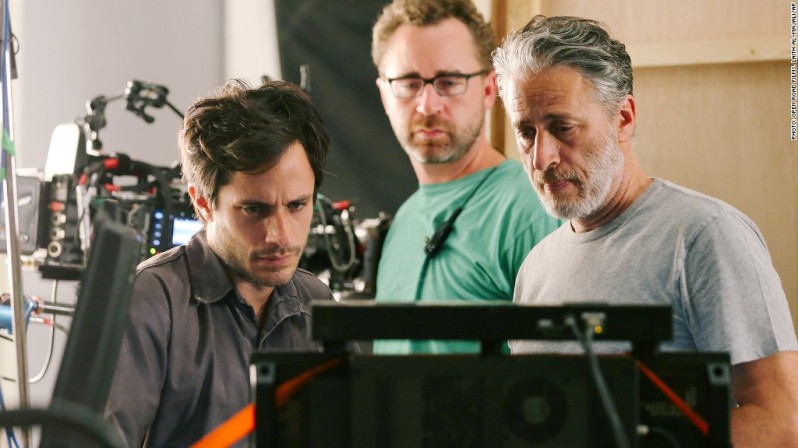Another paper I did for my class, this time reviewing Rosewater.
In his first directorial debut, Rosewater, based on, “Then They Came for Me,” by Maziar Bahari, Jon Stewart ditches his funny man robes to bear witness to a true, heart-wrenching story. Stewart, despite being known as the funny man host on, “The Daily Show,” has shown he can handle gravitas (see his post-9/11 monologue). With this film, he manages it with mixed results.
Bahari, a former Newsweek journalist, appeared in a segment on Stewart’s show in 2009 trading comedic jabs with one of the correspondents, Jason Jones. Iranian officials didn’t see the humor in it and in fact, thought Maziar was a spy. Given this backdrop, one has to wonder if Stewart felt an obligation or a sense of guilt propelling him to tell this story and get it out to the masses.
Right away, the casting leaves something to be desired since the Iranians speak English. Nevertheless, it’s forgivable to the service of appealing to a wider American audience not usually taken to subtitles. Additionally, Gael Garcia Bernal does perform the lead role well since he spends much of his time behind a blindfold; he allows his facial features and his voice to carry the emotion. In particular, Bernal powerfully conveys the rollercoaster of his interrogation from incredulous, they-must-have-the-wrong-guy, to the reality setting in, to the cunning and defiance to not break, buoyed by imagined talks with his father, also imprisoned, but by the Shah in the 1950s.
The first 30-odd minutes of the film are riveting and engaging in showing the domestic side of Iran through the presidential election, featuring the controversial Mahmoud Ahmadinejad and the subsequent protest over a feared corrupt outcome. It’s in these moments, interspersed with seemingly real footage of Amhadinejad and Iranian protests and then Bahari daring to bear witness that Stewart soars as a director. The film style is more chaotic in a mockumentary way that lends the necessary realism one wants when filming unpredictable protests.
Unfortunately, there was still 70 more minutes of film. Those minutes are filled with Bahari’s imprisonment and interrogation at the hands of Javadi or “Rosewater.” So named because of the rosewater he sprays on himself before the interrogations. It offers a nice juxtaposition between something sweet, innocent and the harsh reality of Javadi’s actions. Still, the viewer languishes alongside Bahari, as the film drags this part out to really hammer home the gravitas and injustice of his imprisonment. Worse yet, even when Javadi is punching Bahari in the sternum or kicking him when he’s down, he never comes off as dangerous or a threat. The prison itself, by prison standards, doesn’t look atrocious, either. Sure, there’s some drab, dark lighting, but it’s still too clean of a look, like he’s being interrogated in an office building.
Stewart comes through in the end, though, with a genuinely feel-good, non-manipulative moment when Bahari is allowed to talk with his pregnant wife and learns he’s having a baby girl. At that point, no matter what Javadi does to him, it’s moot because he’s euphoric. Then we get Bahari dancing around to “Dance Me to the End of Love,” by Leonard Cohen, which is a nice bit of meta on Stewart’s part. At the beginning of the film, the Iranians go through Bahari’s mom’s house looking for evidence of his spying. They find “The Sopranos,” then a magazine with Megan Fox on the cover and finally a Leonard Cohen album, all of which are thought to be porn.
Given how often Iran is in the news nowadays over negotiations regarding a nuclear bomb, it’s important to bear witness to one of the key moments in Iran’s modern history. Sure, the film is a mixed sampling, but one that still engages the mind and the heart at certain moments.




I actually heard about this film last year and have been meaning to watch it! Thanks for sharing, really nice and thorough review!
LikeLiked by 1 person
Thank you so much!
LikeLiked by 1 person